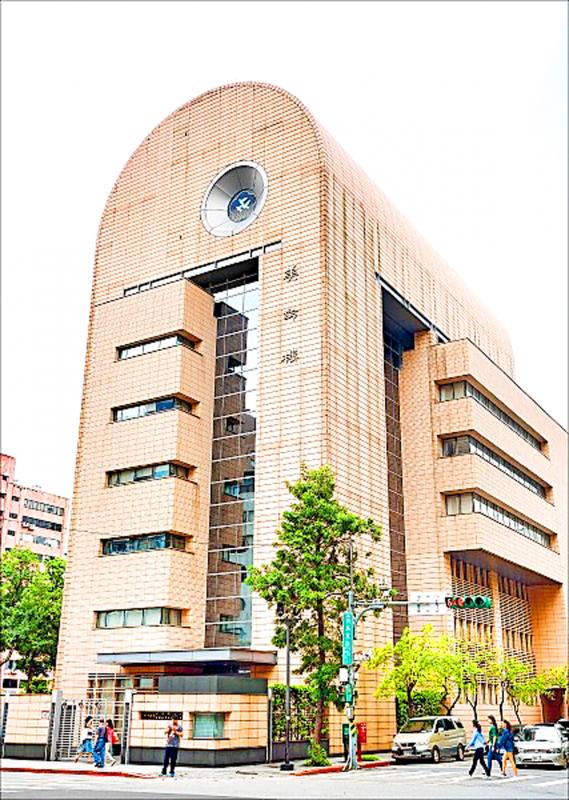The dissolution of the National Women’s League was made official yesterday with a document from the Ministry of Interior (MOI).
The ministry ordered the dissolution because the league refused to transform into a political party in accordance with the the Political Parties Act (政黨法) before a government deadline.
The league was founded in 1950 by Chiang Kai-shek’s (蔣介石) wife, Soong Mayling (宋美齡), to provide care for military families.

Photo: Chen Yu-fu, Taipei Times
According to the act, which took effect on Dec. 6, 2017, all political groups had to revise their charters and transform into political parties within two years following the promulgation of the regulations.
The deadline had been due to expire on Dec. 6 last year, but the ministry extended it for four months to allow the league to make preparations, Deputy Minister of Interior Hua Ching-chun (花敬群) said.
However, as it refused to comply, the ministry was forced to order its dissolution, Hua said.
National Women’s League chair Joanna Lei (雷倩) said that members on Oct. 16 last year voted against becoming a party.
In a news release on Sunday, Lei said that the ministry should not dissolve the group, as it was transforming into a public welfare foundation.
The transformation order was a breach of the Constitution, which guarantees freedom of assembly and association, she said.
The league decided against becoming a party out of concern that it would continue to be subject to political persecution by the government’s Ill-gotten Party Assets Settlement Committee, she said.
The committee in February 2018 ruled that the league was affiliated with the Chinese Nationalist Party (KMT) and in March last year it froze NT$38.7 billion (US$1.29 billion at the current exchange rate) of its assets, ruling that they belong to the state.

The Ministry of Economic Affairs has fined Taobao NT$1.2 million (US$36,912) for advertisements that exceed its approved business scope, requiring the Chinese e-commerce platform to make corrections in the first half of this year or its license may be revoked. Lawmakers have called for stricter enforcement of Chinese e-commerce platforms and measures to prevent China from laundering its goods through Taiwan in response to US President Donald Trump’s heavy tariffs on China. The Legislative Yuan’s Finance Committee met today to discuss policies to prevent China from dumping goods in Taiwan, inviting government agencies to report. Democratic Progressive Party Legislator Kuo Kuo-wen (郭國文) said

The Ministry of Economic Affairs has fined Taobao NT$1.2 million (US$36,900) for advertisements that exceeded its approved business scope and ordered the Chinese e-commerce platform to make corrections in the first half of this year or its license would be revoked. Lawmakers have called for stricter supervision of Chinese e-commerce platforms and more stringent measures to prevent China from laundering its goods through Taiwan as US President Donald Trump’s administration cracks down on origin laundering. The legislature’s Finance Committee yesterday met to discuss policies to prevent China from dumping goods in Taiwan, inviting government agencies to report on the matter. Democratic Progressive Party

Taiwan and its Pacific ally Tuvalu on Tuesday signed two accords aimed at facilitating bilateral cooperation on labor affairs, according to Taiwan’s Ministry of Foreign Affairs (MOFA). The governments inked two agreements in Taipei, witnessed by Foreign Minister Lin Chia-lung (林佳龍) and visiting Deputy Tuvaluan Prime Minister Panapasi Nelesone, MOFA said in a news release. According to MOFA, the agreements will facilitate cooperation on labor issues and allow the two sides to mutually recognize seafarers’ certificates and related training. Taiwan would also continue to collaborate with Tuvalu across various fields to promote economic prosperity as well as the well-being of their

Sung Chien-liang (宋建樑), who led efforts to recall Democratic Progressive Party (DPP) Legislator Lee Kun-cheng (李坤城), was released on bail of NT$80,000 today amid outcry over his decision to wear a Nazi armband to questioning the night before. Sung arrived at the New Taipei District Prosecutors’ Office for questioning in a recall petition forgery case last night wearing a red armband bearing a swastika, carrying a copy of Adolf Hitler’s Mein Kampf and giving a Nazi salute. Sung left the building at 1:15am without the armband and covering the book with his coat. Lee said today that this is a serious